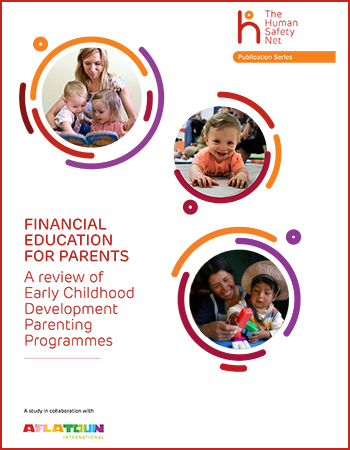Financial Education for Parents
Welcome to The Human Safety Net's Financial Education Programme!
Financial education provides parents with practical tools to manage their limited resources so that their children can grow up in a safe environment and the household can cope with emergency expenses. Financially educated parents are more likely to be able to pay rent, buy healthy food, and afford opportunities that can significantly benefit their children.
Despite the positive effect of financial education, a large part of the adult population is financially illiterate, according to the latest Standard & Poor's Ratings Services Global Financial Literacy Survey.
Support families to make better financial decisions
Not many parenting programmes provide the basis for financial education. Moreover, only a few existing financial education programmes are tailored to the needs of families. Parents and caregivers play a pivotal role in the early development of children.
In 2021, The Human Safety Net collaborated with Aflatoun to conduct a comprehensive study on parenting programmes in 20 countries. The findings underscored the critical role of financial education in early childhood programs.
Developing financial literacy training modules with UNICEF
Pilots have taken place in Italy and Indonesia. In addition to traditional face-to-face delivery, the pilot project explored other channels (radio, TV, social media, and messaging). It also explored innovative ways of connecting financial education with child welfare programmes. The partnership was made possible by a joint contribution of Generali and employee donations relating to We SHARE, the group's share ownership plan.
Pilot Success in 2022
The study developed by Aflatoun International provided the basis for a partnership with UNICEF to build and test a financial literacy training module, including topics such as 'identifying sources of income', 'smart saving', 'budgeting' and 'borrowing money'. Collaborating with UNICEF and Aflatoun, we implemented the "Enhancing Parenting Support with Financial Literacy" pilot project in Indonesia and Italy. Over 1800 parents participated, with a remarkable impact: 60% reported increased awareness of their children's needs and the impact of economic issues on their well-being.
Integrating Financial Education within the For Families programme
Financial education is now a strategic component of the For Families Program at The Human Safety Net. This integration addresses both the financial needs of parents and caregivers while fostering responsive caregiving and creating more opportunities for early learning. Supporting parents by enhancing their financial decision-making is a powerful strategy. It equips them to use limited resources optimally, ultimately enabling them to provide the best care for their children.
Expanding Our Commitment
From 2023, The Human Safety Net is expanding its Financial Education for Families program in Italy and introducing it in five new countries: Germany, France, Spain, India, and Poland. Over 5000 parents are expected to go through the education program, enhancing their capacity to prioritize family budgets and plan for their children's future.
Photo credits: Veronika Pilatova and Aflatoun International



